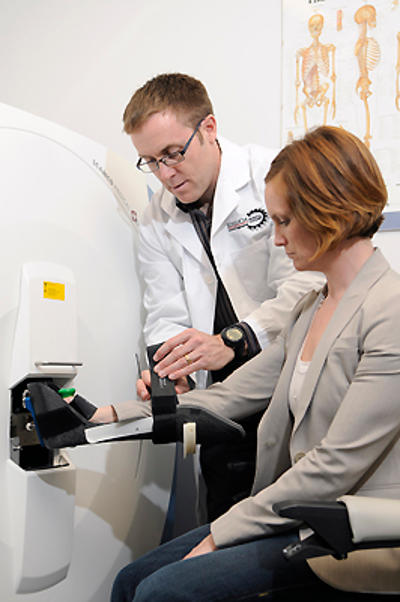June 5, 2015
Calgary researcher leads international study on space flight bone loss

Steven Boyd uses 3D imaging equipment to measure bone health and strength.
Riley Brandt, University of Calgary
This week, Industry Minister James Moore was joined in Ottawa by Commander Chris Hadfield and astronauts Jeremy Hansen and David Saint-Jacques where he announced Canada's commitment to fly two Canadian astronauts to space by 2024.
As part of this announcement, four new Canadian science experiments will be conducted aboard the International Space Station (ISS) in the fall.
University of Calgary researcher, Steven Boyd, PhD, will lead one of four experiments conducted by Canadian universities. His project, dubbed “TBone" to reflect the ‘three-dimensional bone’ techniques used, will investigate the effects of weightlessness on the human body
“These long-term, collaborative projects have the potential to produce truly world-changing discoveries,” says Ed McCauley, vice-president (research). “Dr. Boyd’s project not only demonstrates our capacity for leading-edge biomedical engineering research, it also complements our Earth-Space research priority. I look forward to all they will accomplish.”
Study will measure how bone microarchitecture recovers from weightlessness
In various circumstances — such as aging, immobilization in bed for long periods of time, or when an astronaut is floating in weightlessness — the bones supporting the body's weight lose their density and strength. Using new 3D imaging technology that can distinguish both changes in bone tissue and better assess bone strength, Boyd’s study will measure the effect of weightlessness on bone microarchitecture and how that microarchitecture recovers as astronauts adapt back to life on earth.
As part of the project, astronauts will undergo bone scans before and after space flight to measure bone density and architecture. A scanner will be installed at NASA’s Johnson Space Center in Texas and all the astronauts will be scanned by highly trained University of Calgary technicians who will fly to Houston on a regular basis to conduct the astronaut measurements.
Analysis of the data collected will be done at the McCaig Institute for Bone and Joint Research at the university. The study will also make use of data-sharing with other scientists to access data from blood and urine samples, as well as in-flight food intake, medication, supplements and exercise. Together, these data will help researchers understand susceptibility to bone loss in individuals, and importantly, whether these changes are permanent or can be recovered once back on earth.
Project combines state-of-the-art technology and a highly specialized team of scientists
“This is an exciting project that brings together state-of-the-art technologies and a team of scientists to study a very special cohort. The opportunity to access astronauts who spend half a year in a weightlessness environment is a real privilege, and it’s anticipated that the insight we gain in this study can help inform what happens in even longer duration voyages such as future Mars missions,” says Boyd, a researcher in the Cumming School of Medicine and McCaig Institute for Bone and Joint Health, who also runs the Bone Imaging Laboratory.
Space flight bone loss is important to understand as it affects future plans for long term space flight, but it also provides important insight into terrestrial conditions, such as bone loss due to immobilization or what happens to bones in women during menopause. The goal of Boyd’s project is to better understand bone loss, identify those who are predisposed to bone loss, and use that information to establish individualized treatments.
The first set of measurements for the experiment will be gathered in late summer. Boyd will travel to Houston with his University of Calgary colleague Paul Hulme, PhD. The project is expected to last until 2020.
Steven Boyd is a professor in the Cumming School of Medicine in the Department of Radiology at the University of Calgary and holds a joint position with the Schulich School of Engineering and the Faculty of Kinesiology. He is a member of the University of Calgary’s McCaig Institute for Bone and Joint Health, and is an Alberta Innovates - Health Solutions Senior Scholar. He also holds the Bob and Nola Rintoul Chair in Bone and Joint Research.
The University of Calgary’s multidisciplinary Engineering Solutions for Health: Biomedical Engineering research strategy is focused on pressing health challenges like disease and injury prevention, diagnosis and treatments. These advances are also applying systems engineering principles to continuously improve the health system.
